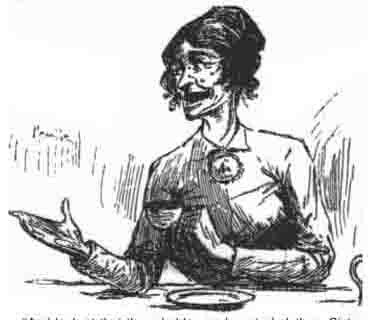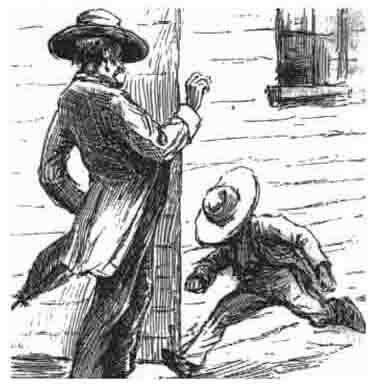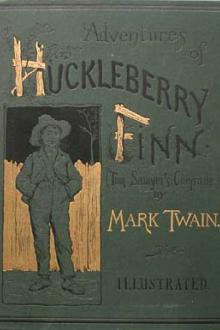Huckleberry Finn, Dave Mckay, Mark Twain [new books to read TXT] 📗

- Author: Dave Mckay, Mark Twain
Book online «Huckleberry Finn, Dave Mckay, Mark Twain [new books to read TXT] 📗». Author Dave Mckay, Mark Twain
I think that’ll be the best way.”
“Now, there’s good thinking in that,” I says. “Letting on don’t cost nothing; and if it’s any help, I don’t mind letting on we was at it a hundred years. It wouldn’t hurt me none, after I got my hand in. So I’ll get along now, and rob two or three table-knives.”
“Rob three,” he says; “we want one to make a saw out of.”
“Tom, if it ain’t against the rules to say it, there’s a dirty old saw-blade sticking under the boards behind the smoke-house.”
He looked kind of tired and sad-like, and says: “It ain’t no use to try to learn you nothing, Huck. Run along and rob the knives -- three of them.” So I done it.

Chapter 36

As soon as we knew everyone was asleep, we went down the lightning-rod, and shut our-selves up in the lean-to, and got out the fox-fire, and went to work. We moved everything out of the way, about four or five foot along the middle of the bottom log. Tom said we was right behind Jim’s bed now, and we’d dig in under it, and when we got through there couldn’t nobody in the shack ever know there was any hole there, because Jim’s quilt came down almost to the ground, and you’d have to lift it up and look under to see the hole. So we worked and worked with the table-knives until almost midnight; and then we was dog-tired, and our hands was covered in sores, and yet you couldn’t see we’d done anything hardly.
At last I says: “This ain’t no thirty-seven year job; this is a thirty-eight year job, Tom Sawyer.”
He never said nothing. But he breathed deeply, and pretty soon he stopped digging, and then for a good little while I knowed he was thinking. Then he says: “It ain’t no use, Huck, it ain’t a-going to work. If we was prisoners it would, because then we’d have as many years as we wanted, and no hurry; and we wouldn’t get but a few minutes to dig, every day, while they was changing watches, and so our hands wouldn’t get sore, and we could keep it up, year in and year out, and do it right, the way it should be done. But we can’t do that; we got to hurry; we ain’t got no time to waste. If we was to put in another night this way we’d have to knock off for a week to let our hands get better -- couldn’t touch a table-knife with them sooner.”
“Well, then, what we going to do, Tom?”
“I’ll tell you. It ain’t right, and it’s a sin, and I wouldn’t like it to get out; but there ain’t only just the one way: we got to dig him out with the shovel, and let on it’s table-knives.”
“Now you’re talking!” I says; “your head gets leveler and leveler all the time, Tom Sawyer,” I says. “Shovels is the thing, sin or no sin; and as for me, I don’t care dirt for the sin of it, anyway. When I start in to rob a slave, or a watermelon, or a Sunday-school book, I ain’t no ways worried how it’s done, just so it’s done. What I want is my black man; or my watermelon; or my Sunday-school book; and if a shovel is the best thing, that’s the thing I’m a-going to dig that black man or that watermelon or that Sunday-school book out with; and I don’t give a dead rat what the experts thinks about it either.”
“Well,” he says, “there’s reason enough for shovels and letting-on in a job like this; if it weren’t so, I wouldn’t agree to it, and I wouldn’t stand by and see the rules broke -- because right is right, and wrong is wrong, and a body ain’t got no business doing wrong when he knows better. It might answer for you to dig Jim out with a shovel, without any letting on, because you don’t know no better; but it wouldn’t for me, because I do know better. Give me a table-knife.”
He had his own by him, but I handed him mine. He threw it down, and says:
“Give me a table-knife.”
I didn’t know just what to do -- but then I thought. I scratched around through the old tools, and got a shovel and give it to him, and he took it and went to work, and never said a word.
He was always just that careful to do the thing right.
So then I got a shovel too, and then we made the feathers fly. We stayed at it about a half an hour, which was as long as we could stand up; but we had a good start of a hole to show for it. When I got up the steps to our room I looked out at the window and see Tom doing his level best with the lightning-rod, but he couldn’t come it, his hands was so sore. At last he says: “It ain’t no use, it can’t be done. What do you think I should do? Can’t you think of no way?”
“Yes,” I says, “but I think it ain’t by the rules. Come up the steps, and let on it’s a lightning-rod.”
So he done it.
Next day Tom robbed a spoon and a candle-stick, for to make some pens for Jim out of, and six candles; and I wait- ed around the Blacks’ cabins until I was able to rob three tin plates. Tom said it weren’t enough; but I said nobody wouldn’t ever see the plates that Jim throwed out, because they’d fall in the weeds under the window-hole -- then we could carry them back and he could use them over again. So Tom was happy with that. Then he says: “Now, the thing to study out is, how to get the things to Jim.”
“Take 'em in through the hole,” I says, “when we're done.”
He only just looked angry, and said something about nobody ever heard of such a stupid plan, and then he went to studying. By and by he said he had worked out two or three ways, but there weren’t no need to choose any of them yet. Said we’d got to tell Jim what was happening first.
That night we went down the lightning-rod a little after ten, and took one of the candles along, and listened under the window-hole, and heard Jim snoring; so we threw it in, and it didn’t wake him. Then we got to work with the shovel, and in about two hours and a half the job was done. We worked our way in under Jim’s bed and into the shack, and felt around and found the candle and put a light to it, and stood over Jim. He looked strong and healthy. Softly and slowly we got him to wake up. He was so glad to see us he almost cried; and called us honey, and all the nice names he could think of; and was for having us hunt up something to cut the chain off of his leg with right away, and leaving there without losing any time. But Tom he showed him how wrong it would be, and sat down and told him all about our plans, and how we could change them in a minute any time there was any trouble; and not to be the least afraid, because we would see he got away, sure. So Jim he said it was all right, and we sat there and talked over old times for a while, and then Tom asked a lot of questions, and when Jim told him Uncle Silas come in every day or two to pray with him, and Aunt Sally come in to see if he was comfortable and had enough to eat, and both of them was kind as they could be, Tom says: “Now I know how to fix it. We’ll send you some things by them.”
I said, “Don’t do nothing of the kind; it’s one of the most donkeyest plans I ever heard.” But he never paid no listen to me; went right on. It was his way when he’d got his plans set.
So he told Jim how we’d have to get in the rope-ladder pie and other big things by Nat, the black man that brought the food in, and he must be on the watch, and not be surprised, and not let Nat see him open them; and we would put small things in uncle’s coat pockets and he must rob them out; and we would tie things to aunt’s apron strings or put them in her apron pocket, if we could; and told him what they would be and what they was for. And told him how to keep a diary on the shirt with his blood, and all that. He told him everything. Jim he couldn’t see no good in the most of it, but he said we was white people and knowed better than him; so he was happy, and said he would do it all just as Tom said.
Jim had a lot of tobacco; so we had a right down good friendly time smoking it; then we climbed out through the hole, and so home to bed, with hands that looked like they’d been chewed. Tom was in high spirits. He said it was the best fun he had ever had in his life, and the most smartest; and said if he only could see his way to it we would keep it up all of our lives and leave Jim for our children to get out; for he believed Jim would come to like it better and better the more he got used to it. He said that in that way it could be pulled out to as much as eighty years, and would be the longest time ever. And he said it would make us -- all that had a hand in it -- known around the world.
In the morning we went out to where the firewood was and cut up the candlestick into the right size pieces, and Tom put them and the spoon in his pocket. Then we went to the slave cabins, and while I got Nat looking off, Tom pushed a piece of candlestick into the middle of corn-bread that was in Jim’s pan, and we went along with Nat to see how it would work, and it just worked perfectly; when Jim took a bite of that bread it almost broke all his teeth out; and there weren’t ever anything could a worked better. Tom said so himself. Jim he never let on but what it was only just a piece of rock or something like that that’s always getting into bread, you know; but after that he never would take a bite of nothing but what he pushed his fork into it in three or four places first.
And while we was a-standing there in the poor light, here comes two dogs pushing in from under Jim’s bed; and more kept on coming in until there was eleven of them, and there weren’t hardly room in there to breathe. Good lord, we didn’t lock that lean-to door!
The black man -- Nat -- he only just shouted “Witches” once, and fell over onto the floor down with the dogs, and started to groan like he was dying. Tom pushed the door open and threw out a big piece of Jim’s meat, and the dogs went for it, and in two seconds he was out himself and back again and shut the door, and I knowed he’d fixed the other door too. Then he went to work on the servant, talking nice to him, and asking him if he’d been thinking he saw something again. He lifted himself up, and opened and closed his eyes around, and says: “Master Sid, you’ll say I’s crazy, but if I didn’t believe I seen almost a million dogs, or devils, or someone, I wish I would die right here where I stand. I did, most surely. Master Sid, I felt ‘em -- I felt ‘em, sir; dey was all over





Comments (0)